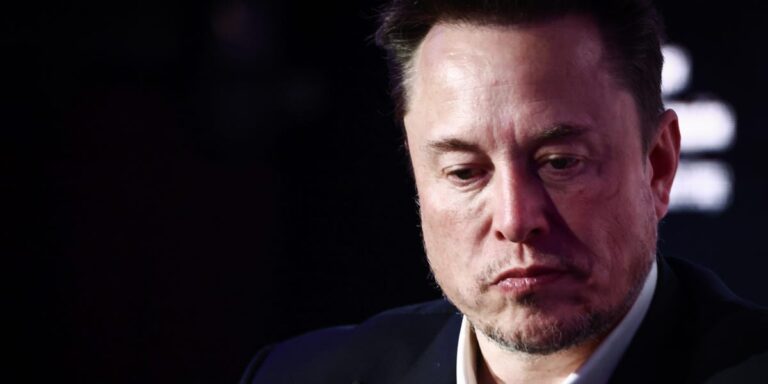- Tesla shares plummeted on Tuesday after second-quarter earnings showed the electric vehicle maker’s performance again fell short of expectations.
- During the conference call, Elon Musk was asked a few quick questions about resource allocation and the delayed robotaxi project.
- The Tesla CEO sounded defensive at times in his response, and perhaps with good reason.
Tesla released a lackluster earnings report on Tuesday, showing that the electric car maker once again failed to meet investor expectations.
And Elon Musk is probably a little nervous.
The automaker’s sales beat expectations slightly, but in its second-quarter results, Tesla’s adjusted profit margin fell to 14.4% from 18.7% a year ago and its free cash flow fell short of analysts’ expectations. by That’s more than $500 million, and earnings per share are now 52 cents, down from 91 cents a year ago.
The billionaire Tesla CEO answered a few brief questions from investors and analysts about the company’s declining car sales revenue, continued delays to its robotaxi project, and whether its current strategy is to continue with limited-edition models rather than investing in mass-producing lower-cost models.
“We’re going to continue to make great products, just like we always have, and that’s it,” Musk replied bluntly.
One of the most tense exchanges came when an analyst asked Musk about reports that his artificial intelligence startup, xAI, had hired engineers from Tesla and that Musk had diverted GPUs meant for Tesla to xAI.
“How do you determine how to allocate across these different businesses and how do you reassure Tesla owners that this is a way of doing things that will actually benefit them?” the analyst asked.
Musk seemed outraged by the news before responding. Repurposing GPUs is “old news” — Tesla rerouted their systems because they didn’t have anywhere to store them — but his startup xAI did it.
“I want to be clear that this was not done against Tesla’s interests, this was done for Tesla’s interests,” Musk said.
Rather than reassuring investors that the company was in a strong position for recovery, Musk’s comments during the conference call appeared to have the opposite effect: By the time he left the call, Tesla shares had fallen more than 7% in after-hours trading.
Some analysts remain bullish on Tesla’s prospects, including Gene Munster, managing partner at Deepwater Asset Management, who told CNBC he believes the company is “on a solid trajectory” to become a $3 trillion company over the next few years.
But Musk has reason to be concerned about his EV company’s current performance.
Tesla has faced declining enthusiasm from buyers and weak demand despite price discounts that have put pressure on the company’s profitability. Mr. Musk has promised innovations like robotaxis and lower-cost models to make them widely available, but those promises have yet to materialize.
In its second-quarter earnings report, Tesla reported that sales at its automotive division fell 7% compared to the same period a year ago, contributing to the company’s lower profits.
Needless to say, there is increasing competition around the world, including China’s rapid expansion in the sector, and Musk acknowledged on the conference call that this is a major concern for the company.
“There’s a lot of competing electric vehicles on the market,” Musk said. “Most of them aren’t doing well, but they’re heavily discounting their electric vehicles, which makes things a little tough for Tesla.”
The situation is further complicated by the company’s heavy investments in artificial intelligence, which CNBC reported saw spending increase 10% year over year to $2.27 billion, further reducing the company’s profit margins.
Tesla’s second-quarter numbers marked the second straight quarter in which the company has seen its profits fall, with its profit margins hitting their worst in five years, according to Reuters. The disappointing results came just after shareholders reapproved Musk’s massive, 10-year, $46.8 billion compensation package.
Dan Coatsworth, an investment analyst at AJ Bell, told Reuters that Tesla has missed profit targets for four consecutive quarters, dampening some investors’ enthusiasm despite Musk’s continued optimism about the company’s prospects.
“There’s a lot of talk about robotaxis, humanoid robots and self-driving cars, which sounds exciting for investors but ignores the fact that these are not the wealth of today but potentially the wealth of tomorrow,” Coatsworth said.
Representatives for Tesla did not immediately respond to Business Insider’s request for comment.

